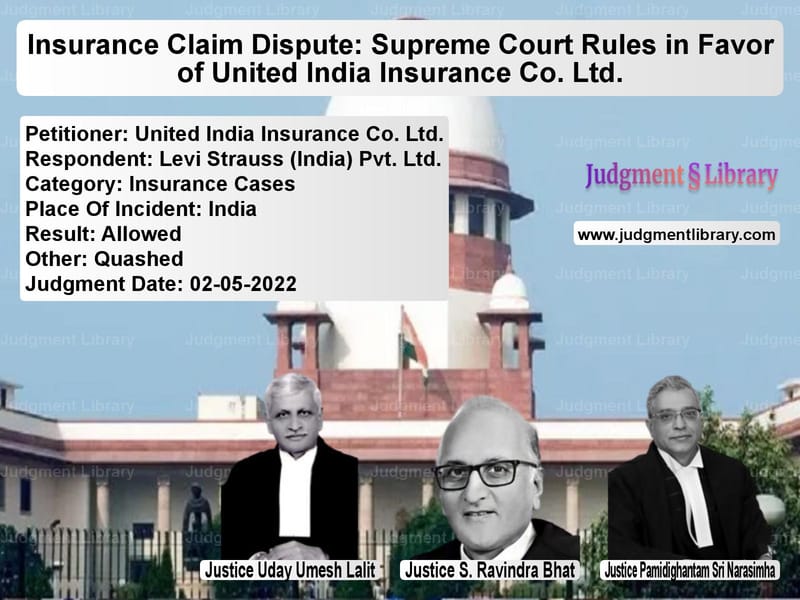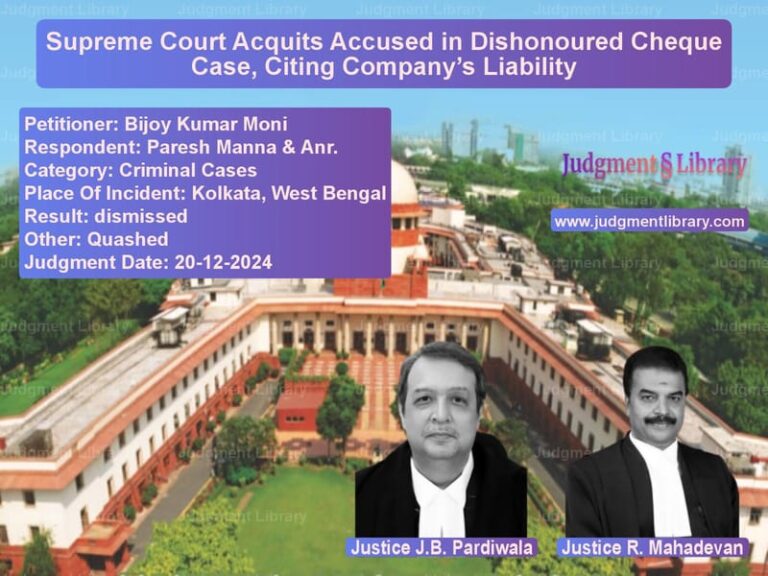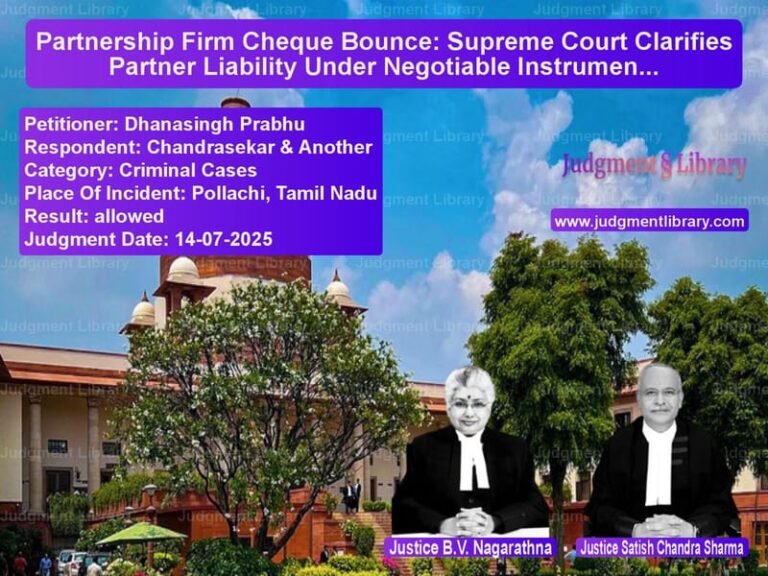Insurance Claim Dispute: Supreme Court Rules in Favor of United India Insurance Co. Ltd.
The Supreme Court of India recently delivered a significant ruling in the case of United India Insurance Co. Ltd. vs. Levi Strauss (India) Pvt. Ltd. This case revolved around an insurance claim dispute following a fire incident at a warehouse containing Levi Strauss’ stock. The primary issue before the Court was whether Levi Strauss could claim compensation under a domestic fire insurance policy despite having a global insurance policy covering similar risks. The Supreme Court’s ruling overturned the decision of the National Consumer Disputes Redressal Commission (NCDRC) and provided clarity on the interplay between multiple insurance policies.
Background of the Case
Levi Strauss (India) Pvt. Ltd. had obtained a Standard Fire & Special Perils Policy (SFSP Policy) from United India Insurance Co. Ltd. for the period of January 1, 2007, to December 31, 2007, which was later renewed for 2008. Additionally, Levi Strauss & Co., its parent company, had secured a global insurance policy from Allianz Global Corporate & Specialty (Allianz) covering stock throughout its subsidiaries, including in India. This global policy, known as the Stock Throughput Policy (STP), provided worldwide coverage for loss due to fire, transit, and other perils.
On July 13, 2008, a fire broke out in a warehouse storing Levi’s goods. Levi Strauss filed a claim of ₹12.20 crores with United India Insurance. A surveyor appointed by the insurer assessed the final loss at ₹11.34 crores. However, United India Insurance repudiated the claim, citing Condition No. 4 of the SFSP Policy, which excluded losses covered by any marine policy. The insurer argued that the global STP Policy issued by Allianz was a marine policy covering the loss, and therefore, Levi Strauss was not eligible for compensation under the domestic fire insurance policy.
Key Legal Issues Before the Supreme Court
- Whether the STP Policy issued by Allianz qualified as a marine insurance policy, thereby triggering the exclusion clause in the SFSP Policy.
- Whether Levi Strauss was obligated under Indian law to obtain domestic insurance and could, therefore, claim under the SFSP Policy.
- Whether the principle of indemnity in insurance law allowed Levi Strauss to claim under both policies.
Arguments Presented
Petitioner’s (United India Insurance Co. Ltd.) Arguments
- The insurer contended that Condition No. 4 of the SFSP Policy explicitly excluded losses covered under marine policies.
- The STP Policy was a marine policy as it covered losses arising from transit and storage.
- Levi Strauss had already received compensation of $4.54 million (~₹19.52 crores) from Allianz under the global STP Policy.
- The claim under the SFSP Policy would result in double insurance recovery, violating the principle of indemnity in insurance law.
Respondent’s (Levi Strauss) Arguments
- Levi Strauss argued that it was obligated under Indian law (Section 25 of the General Insurance Business (Nationalization) Act, 1972) to obtain domestic insurance.
- Condition No. 4 of the SFSP Policy did not apply as the STP Policy was not a marine policy in the strict sense but a commercial all-risk policy.
- The STP Policy and the SFSP Policy covered different risks: the STP Policy covered loss of profits, while the SFSP Policy covered loss of goods.
- The insurer had collected premiums for the SFSP Policy and could not now claim exclusion after an incident.
Supreme Court’s Observations and Ruling
1. STP Policy Was a Marine Policy
The Supreme Court examined the terms of the STP Policy and held that it qualified as a marine insurance policy. The Court noted that the policy explicitly covered goods in transit, at retail locations, and in storage. The ruling stated:
“The coverage under the STP Policy includes transit, storage, and perils akin to marine risks. Therefore, it qualifies as a marine policy, bringing it within the scope of exclusion under Condition No. 4 of the SFSP Policy.”
2. No Legal Obligation to Obtain Domestic Insurance
The Court rejected Levi Strauss’ argument that it was legally required to obtain a domestic insurance policy under Indian law. The judgment clarified:
“Section 25 of the Nationalization Act does not impose a mandatory requirement on companies to obtain domestic insurance but rather regulates foreign insurers. Therefore, the contention that Levi Strauss was obligated to take out an Indian policy does not hold.”
3. Double Insurance and the Principle of Indemnity
The Court emphasized that insurance is a contract of indemnity, meaning that an insured party cannot recover more than the actual loss suffered. Levi Strauss had already received compensation exceeding ₹19 crores from Allianz, whereas its total claim was ₹12.2 crores. The ruling stated:
“An insured cannot profit from insurance. Once indemnification has occurred under a valid policy, claiming under another policy covering the same risk violates the fundamental principle of insurance law.”
4. NCDRC’s Misinterpretation of Policy Terms
The Supreme Court found that the NCDRC erred in interpreting the STP Policy as not being a marine policy. The NCDRC had bifurcated the loss into goods and profits, an approach the Court rejected as artificial and legally incorrect.
Impact of the Judgment
The ruling has far-reaching consequences for the insurance sector:
1. Clarification on Overlapping Insurance Policies
The judgment provides clarity on the interplay between global and domestic insurance policies, ensuring that insurers are not held liable where another valid policy exists.
2. Strengthening the Principle of Indemnity
The ruling reinforces that an insured entity cannot recover more than the actual loss, preventing misuse of multiple policies to claim excess compensation.
3. Regulatory Implications for Insurers
Insurance companies must now clearly define policy exclusions to avoid disputes, while policyholders must carefully evaluate overlapping coverage before making claims.
Conclusion
The Supreme Court’s decision in United India Insurance Co. Ltd. vs. Levi Strauss (India) Pvt. Ltd. is a landmark ruling in insurance law. By upholding the exclusion clause in the domestic policy and emphasizing the principle of indemnity, the judgment ensures that insurance contracts are interpreted fairly and consistently. This ruling will guide future cases involving multiple insurance policies and overlapping claims, providing certainty for both insurers and policyholders.
Petitioner Name: United India Insurance Co. Ltd..Respondent Name: Levi Strauss (India) Pvt. Ltd..Judgment By: Justice Uday Umesh Lalit, Justice S. Ravindra Bhat, Justice Pamidighantam Sri Narasimha.Place Of Incident: India.Judgment Date: 02-05-2022.
Don’t miss out on the full details! Download the complete judgment in PDF format below and gain valuable insights instantly!
Download Judgment: united-india-insuran-vs-levi-strauss-(india)-supreme-court-of-india-judgment-dated-02-05-2022.pdf
Directly Download Judgment: Directly download this Judgment
See all petitions in Commercial Insurance Disputes
See all petitions in Fire and Property Insurance Cases
See all petitions in Other Insurance Cases
See all petitions in Judgment by Uday Umesh Lalit
See all petitions in Judgment by S Ravindra Bhat
See all petitions in Judgment by P.S. Narasimha
See all petitions in allowed
See all petitions in Quashed
See all petitions in supreme court of India judgments May 2022
See all petitions in 2022 judgments
See all posts in Insurance Cases Category
See all allowed petitions in Insurance Cases Category
See all Dismissed petitions in Insurance Cases Category
See all partially allowed petitions in Insurance Cases Category







